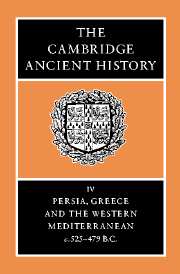Book contents
- Frontmatter
- Contents
- List of maps
- List of text-figures
- List of chronological tables
- Preface
- PART I THE PERSIAN EMPIRE
- PART II THE GREEK STATES
- 4 The tyranny of the Pisistratidae
- 5 The reform of the Athenian state by Cleisthenes
- 6 Greece before the Persian invasion
- 7 Archaic Greek society
- 8 The Ionian Revolt
- 9 The expedition of Datis and Artaphernes
- 10 The expedition of Xerxes
- 11 The liberation of Greece
- PART III THE WEST
- BIBLIOGRAPHY
- Index
- Map 1. The Achaemenid empire
- Map 6. Central Asia
- Map 9. The Black Sea area
- Map 11. Egypt
- Map 13. Greek and Phoenician trade in the period of the Persian Wars
- Map 15. Greece and the Aegean
- Map 18. Northern and Central Italy
- Map 19. Central and Southern Italy
- References
8 - The Ionian Revolt
from PART II - THE GREEK STATES
Published online by Cambridge University Press: 28 March 2008
- Frontmatter
- Contents
- List of maps
- List of text-figures
- List of chronological tables
- Preface
- PART I THE PERSIAN EMPIRE
- PART II THE GREEK STATES
- 4 The tyranny of the Pisistratidae
- 5 The reform of the Athenian state by Cleisthenes
- 6 Greece before the Persian invasion
- 7 Archaic Greek society
- 8 The Ionian Revolt
- 9 The expedition of Datis and Artaphernes
- 10 The expedition of Xerxes
- 11 The liberation of Greece
- PART III THE WEST
- BIBLIOGRAPHY
- Index
- Map 1. The Achaemenid empire
- Map 6. Central Asia
- Map 9. The Black Sea area
- Map 11. Egypt
- Map 13. Greek and Phoenician trade in the period of the Persian Wars
- Map 15. Greece and the Aegean
- Map 18. Northern and Central Italy
- Map 19. Central and Southern Italy
- References
Summary
INTRODUCTION
Like the Jews, the Greeks learned to define themselves as a nation in the course of their contacts with the Persians: from the series of conflicts between them in the early fifth century arose that sense of separateness and superiority over other peoples which created the conditions for Greek culture of the fifth century, exclusive, self-confident and hellenocentric. It is this autonomous aspect of Greek culture which has caused it to become the Classical Age for European civilization. As John Stuart Mill declared, ‘The battle of Marathon, even as an event in English history, is more important that the battle of Hastings. If the issue of that day had been different, the Britons and the Saxons might still have been wandering in the woods.’
It is hard to discern to what extent Herodotus' Histories are a symptom or the cause of this central importance of the Persian Wars in the history of western culture. Born between the two great wars, composing his work as a contemporary of Sophocles some thirty years after their end, he retained an understanding of the wider horizons of early Greece, which made Plutarch accuse him of being ‘a friend of the barbarian’ (Mor. 857A). Yet it was his conception of the meaning of the Persian Wars which caused him to write the first non-religious historical narrative, and it is his history which in turn has given these wars their universal significance.
This is the account of the investigation of Herodotus of Halicarnassus, undertaken so that the achievements of men should not be obliterated by time, and the great and marvellous works of both Greeks and barbarians should not be without fame, and not least the reason why they fought one another. (Herodotus 1.1)
- Type
- Chapter
- Information
- The Cambridge Ancient History , pp. 461 - 490Publisher: Cambridge University PressPrint publication year: 1988
References
- 22
- Cited by

